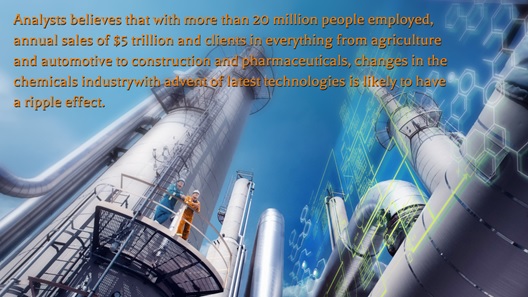
Chemicals industry is undergoing a revamp of its operations and working structure with the integration of digitalization in chemicals industry. Digitalization is being mentioned here as being the category inclusive of all the digital technologies that enhance the business structure and provide significant ease in operations thereby resulting in enhancement of business models. The technologies included in the wide term are:
- Internet of Things (IoT) – Probably, the most diversified and vast technology currently available worldwide, which involves interconnectivity of various electric components, devices, machines and sensors in a common working interface which helps in collection of data and identifying where the focus of innovation is required along with the area where the highest impact will be seen. For example, the information collected through sensors integrated on some faulty machines informed the user regarding the impact it was having on the productivity of the whole factory, where without the application of IoT this might have been overlooked.
- Cloud/Cloud Computing – This technology involves the usage of a common storage system for the data generated from the various operations of the chemicals industry such as, production, sales, servicing and maintenance of products and machines for the manufacturers, suppliers, distributors and end-users.
- Analytics – This technology involves the usage of the data collected from various sensors, components and data formulated from the various research & development activities conducted in the chemicals industry and analyzing the millions of data at a highly effective and efficient rate. For example – the data stream created with the research and development activities conducted by various scientists requires that the data collected is transformed into something meaningful at a highly effective rate; this is where analytics comes into work, where a number of high-powered computers compute and analyze this particular set of data and display it into conclusive and useful information.
- Machine Learning – The application of this technology revolves around the timely checkup of components, devices, machines involved in the chemicals industry along with the self-learning of the machines for the optimal production process and method which results in the highest productivity. This technology informs and reminds the user when the devices/machines might be in need of maintenance and if not conducted, their productivity might start to decline.
- Blockchain – Integration of this technology involves recording of every transaction from the purchasing of raw material from its origin to the sale of the final product created from these raw materials to the end-user. This virtual technology is like a virtual transaction recording and transaction facilitating service where the users and manufacturers can transparently look through each and every transaction they ever make. For example: The purchase of base chemicals from a particular manufacturer can be conducted through this service for the production of a particular chemical product which is then subsequently sold off as a final product to the end-user through this service itself. The end-user can look through each and every transaction and origination of its product from the purchase of its raw material to the sale of the final product.
Although, even with the presence of these significant technologies chemicals industry cannot expand with just their presence, they need to be equipped with the knowledge on how to combine these technologies in their business models and operations to take advantage of the opportunity present. This requires the requirement of flexibility from the corporates in charge of the chemicals industry where they are comfortable enough to keep the needs of the customers above their own which might result in the long-term benefits of the corporates and corporation itself.










